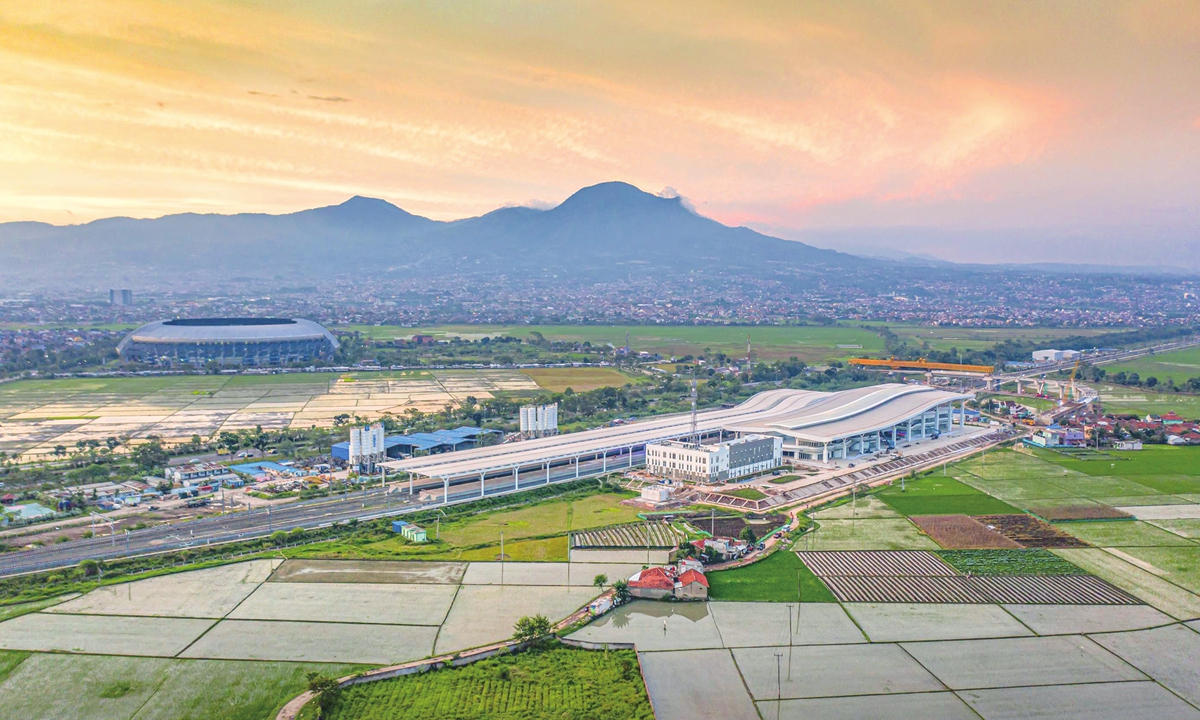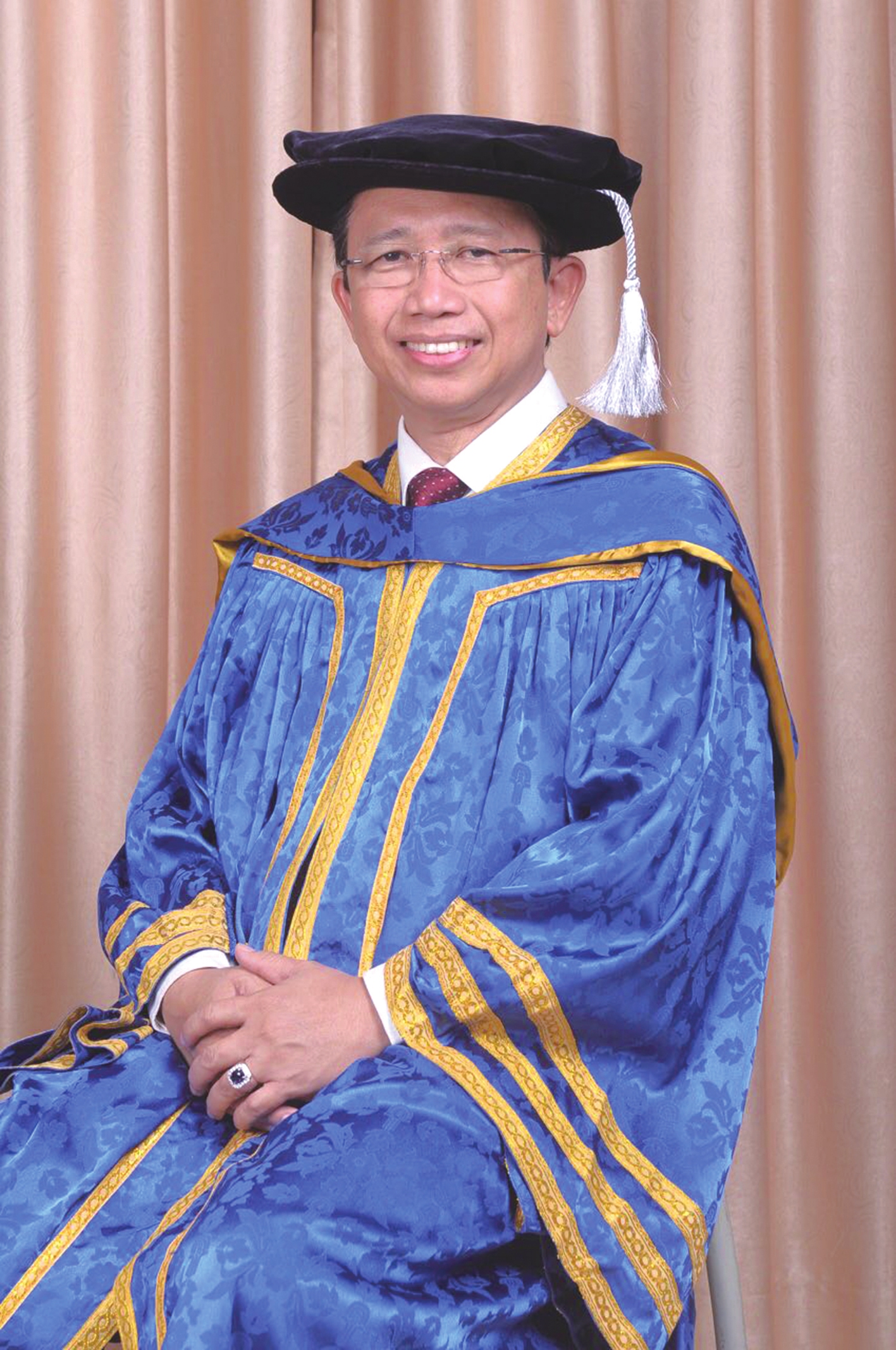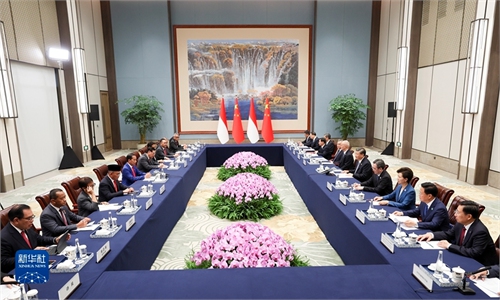China's BRI proposal 'very significant' for international cooperation: former Indonesian parliament speaker


An overview of a train station along the Jakarta-Bandung High-Speed Railway in Bandung in May, 2023 Photo: Courtesy of PT Kereta Cepat Indonesia China
Editor's Note:This year marks the 10th anniversary of the China-proposed Belt and Road Initiative (BRI), a global cooperation platform that demonstrates China's vision for global development and offers solutions to the reform of the global governance system and multi-faceted challenges. Against this backdrop, the Global Times is publishing a series of interviews with renowned scholars, think tanks and financial institutions, sharing their insights and understanding of how this initiative has earned global recognition and growing esteem. This is the 11th installment in the series.
Recently, Global Times reporters Li Xuanmin and Hu Yuwei (GT) conducted an interview with Marzuki Alie (Marzuki), former speaker of The House of Representative of Republic of Indonesia and rector of University of Indo Global Mandiri. In a speech delivered by Chinese President Xi Jinping at the Indonesian parliament in 2013, he put forward the 21st Century Maritime Silk Road for the first time, which together with the proposal of the Silk Road Economic Belt constitutes the original sketch of BRI. As speaker of the Indonesian parliament then, Marzuki accompanied Xi into the parliament hall and listened to Xi's speech.
During the interview, Marzuki talked about his feelings when President Xi introduced the initiative and recalled more details at that time. According to Marzuki, BRI cooperation between China and Indonesia has delivered value across a number of industries, including infrastructure, investment, trade, tourism, and maritime partnership, which could serve as a model for mutually beneficial cooperation and joint development among other developing countries.

Marzuki Alie Photo: Courtesy of Marzuki Alie
GT: You witnessed Chinese President Xi Jinping's proposal of the 21st Century Maritime Silk Road Initiative at the Indonesian House of Representatives in 2013. What were your feelings at that time?
Marzuki: I believe that President Xi's address to the Indonesian parliament at that time was very significant, not only for Indonesia-China relations, but also for international cooperation. At that time, Xi introduced the 21st Century Maritime Silk Road Initiative, which later constitutes an important part of the Belt and Road Initiative (BRI).
BRI seeks to establish a large-scale and comprehensive program of infrastructure development in the countries along the land and maritime routes. In his speech, Xi highlighted BRI as a path of peace and cooperation, openness and inclusivity, mutual learning and mutual benefit.
China demonstrates a cooperative disposition that will yield mutual benefits. I believe it is essential for the Indonesian government to respond to the China-proposed initiative. The Indonesian government recognizes the significance of regional connectivity and investment in accelerating the country's economic growth and infrastructure development.
Economically, Indonesia was one of the largest economies in Southeast Asia at the time and had experienced robust economic development over the preceding years. Through business-friendly policies and structural reforms, the Indonesian government has worked to increase investment and economic growth. The BRI is viewed as an opportunity to increase regional connectivity, enhance trade, and improve Indonesia's infrastructure.
Politically, Indonesia has experienced a series of relatively stable leadership transitions. In 2013, then-president Susilo Bambang Yudhoyono assumed office as Indonesia's leader. Indonesian government was interested in expanding economic partnerships with other countries at that time, including China, in order to expedite infrastructure development and close development disparities between different Indonesian regions. When President Joko Widodo led the government in the next term, he also envisioned Indonesia to become a "World Maritime Axis."
GT: Chinese President Xi's visit to Indonesia in 2022 has consolidated bilateral relations. How do you view the relations between China and Indonesia?
Marzuki: At the 2022 G20 Bali Summit, the two leaders witnessed the signing of cooperation documents between Indonesia and China, which consisted of a Joint Promotion Cooperation Plan within the World Maritime Axis Framework and the Belt and Road Initiative, a Memorandum of Understanding on the Joint Development of Conservation/Research Centers and Innovation of Indonesian-China Medicinal Plants, Memorandum of Understanding on Vocational Training in the Industrial Sector, Memorandum of Understanding on Increasing Digital Economic Cooperation, and Agreement on Further Expansion and Deepening of Bilateral Economic and Trade Cooperation.
This is significant for the potential development of relations between the two nations. In order to accomplish a mutually beneficial relationship in the future, it is vital for China and Indonesia to maintain constructive dialogue and cooperation and to overcome potential differences and obstacles.
Considering the current situation of the world, there are a number of new opportunities that can be pursued in the future economic relations between China and Indonesia, such as economic and commercial cooperation, investment in infrastructure, innovation and technology, tourism, and maritime cooperation.
China and Indonesia's inclusive economic cooperation, transfer of technology and knowledge, infrastructure and connectivity, cultural and educational exchanges can serve as a model for mutually beneficial cooperation and joint development among other developing countries.
GT: This year marks the 10th anniversary of the BRI. From your observations and understanding, what have been the biggest changes in Indonesia in the past decade under the initiative?
Marzuki: In 2023, it will have been precisely 10 years since I presided over the Indonesian parliament during Xi's visit. That year was definitely an important year, and over the past 10 years, the cooperation between China and Indonesia has increased in a variety of disciplines.
Significant developments have undergone in infrastructure, investment, trade, tourism, and maritime partnership, though there are certain challenges. It is essential for project to strike a balance between economic benefits and sustainability.
Indonesia has received investment from China to build and improve infrastructure in this country. Additionally, funding is also allocated for the construction of ports, toll roads, airports, and energy initiatives. The two nations have signed agreements and begun large-scale projects, including the Jakarta-Bandung High-speed Railway (HSR).
Numerous Chinese companies have invested in infrastructure, energy, manufacturing, and tourism in Indonesia via BRI. This investment has contributed to the positive impact on Indonesia's economic growth and employment creation.
BRI has increased trade connectivity between the two nations, promoted the exchange of products and services, and improved market access. China is now Indonesia's largest trading partner, with bilateral commerce increasing in value year after year.
Also, numerous airlines have established direct flights between the two nations, making it easier for tourists to travel to Indonesia. The number of Chinese tourists visiting Indonesia has increased since the implementation of BRI.
In addition, the two nations have collaborated on port development, maritime cooperation, and the expansion of maritime connectivity. This entails the development of Kendal Port in Central Java and Malacca Straits cooperation.
GT: Can you update us on the progress of the Jakarta-Bandung HSR project? And from your perspective, what are the benefits the high-speed railway will bring?
Marzuki: The Jakarta-Bandung high-speed rail cooperation has exhibited a number of observable aspects. This project is an ambitious infrastructure transportation endeavor.
Chinese corporations, including China Development Bank and China Railway Corporation, invested in the project. This foreign direct investment is a concrete example of China and Indonesia's economic collaboration.
In addition to Chinese investment, Indonesian private companies are also involved in this initiative. This demonstrates public and private sector collaborating in infrastructure development. The participation of the Indonesian private sector in the project enables growth opportunities for the domestic construction and transportation industries.
The Jakarta-Bandung HSR also employs Chinese high-speed train technology. This affords Indonesia the chance to acquire knowledge and experience in the operation and maintenance of an advanced high-speed railway system. This technology transfer can contribute to the overall growth of Indonesia's transportation and technology industries.
It is also anticipated to increase regional tourism. By shortening the travel time, the project enables tourists to visit tourist destinations along the fast train route, such as Puncak, Bandung and its environs. This can have a positive impact on the growth of the tourism sector and the regional economy.
Nevertheless, the Jakarta-Bandung HSR project confronts several challenges, including land acquisition, project financing, and delayed construction completion. It is crucial that the Indonesian government and related parties continue to overcome this obstacle so that the project can operate smoothly and provide Indonesia with the anticipated benefits.
GT: This year marks the 10th anniversary of China's proposal to build a closer China-ASEAN community with a shared future. How have relations between China and ASEAN developed during recent years?
Marzuki: Until now, the China-ASEAN community has undergone significant development, including increased cooperation accomplishments.
There was an increase in economic cooperation. China is ASEAN's largest trading partner, while ASEAN is China's second largest trading partner. Trade agreements, such as the Regional Comprehensive Economic Partnership (RCEP), have enhanced the two parties' economic cooperation.
Similarly, investment grew. China has emerged as one of the most important sources of foreign direct investment for ASEAN nations. These investments have bolstered ASEAN's economic growth and created employment opportunities.
Additionally, the China-ASEAN community has collaborated on infrastructure development, including via the BRI. Furthermore, cooperation in the areas of education, culture, and tourism also expanded.
In the future, the China-ASEAN Community should focus on enhancing economic cooperation, advancing infrastructure development, exchanging academic and human resources, cooperating on environmental issues, and ensuring security and stability. With closer cooperation and synergy between China and ASEAN, the potential to create greater benefits for both sides will occur in the Southeast Asian region.


